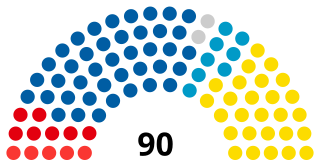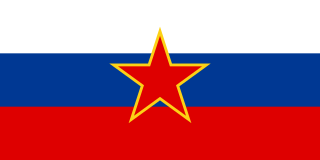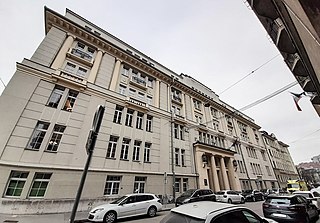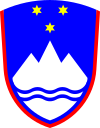
A referendum is a direct vote by the electorate on a proposal, law, or political issue. This is in contrast to an issue being voted on by a representative. This may result in the adoption of a new policy or specific law, or the referendum may be only advisory. In some countries, it is synonymous with and also known as plebiscite, votation, popular consultation, ballot question, ballot measure, or proposition.

Referendums in the United Kingdom are occasionally held at a national, regional or local level. Historically, national referendums are rare due to the long-standing principle of parliamentary sovereignty. There is no constitutional requirement to hold a national referendum for any purpose or on any issue however the UK Parliament is free to legislate through an Act of Parliament for a referendum to be held on any question at any time.
The Constitution of the Republic of Slovenia is the fundamental law of the Republic of Slovenia.
Regular elections in Croatia are mandated by the Constitution and legislation enacted by Parliament. The presidency, Parliament, county prefects and assemblies, city and town mayors, and city and municipal councils are all elective offices. Since 1990, seven presidential elections have been held. During the same period, ten parliamentary elections were also held. In addition, there were nine nationwide local elections. Croatia has also held three elections to elect members of the European Parliament following its accession to the EU on 1 July 2013.

The National Assembly is the general representative body of Slovenia. According to the Constitution of Slovenia and the Constitutional Court of Slovenia, it is the major part of the distinctively incompletely bicameral Slovenian Parliament, the legislative branch of the Republic of Slovenia. It has 90 members, elected for a four-year term. 88 members are elected using the party-list proportional representation system and the remaining two, using the Borda count, by the Hungarian and Italian-speaking ethnic minorities, who have an absolute veto in matters concerning their ethnic groups.

The Slovenian National Party is a nationalist political party in Slovenia led by Zmago Jelinčič Plemeniti. The party is known for its Euroscepticism and opposes Slovenia's membership in NATO. It also engages in what many consider to be historical negationism of events in Slovenia during World War II.
A process model is, in the context of the republic debate in Australia, a model for the process by which the questions surrounding whether and how Australia should become a republic may be answered. A number of process models have been processed. Proposed process models are a subject of debate within the Republicanism movement. Such debate usually surrounds whether the people should be asked to choose between the current system and a general republican system of government, one specific republican system of government, or multiple alternative republican systems of government.

A double referendum was held in Transnistria on 17 September 2006. Voters were asked whether they approved of the possibility of renouncing independence and integration with Moldova, or alternatively independence and a possible future integration into the Russian Federation.

The Socialist Republic of Slovenia, commonly referred to as Socialist Slovenia or simply Slovenia, was one of the six federal republics forming Yugoslavia and the nation state of the Slovenes. It existed under various names from its creation on 29 November 1945 until 25 June 1991.
Croatia held an independence referendum on 19 May 1991, following the Croatian parliamentary elections of 1990 and the rise of ethnic tensions that led to the breakup of Yugoslavia. With 83 percent turnout, voters approved the referendum, with 93 percent in favor of independence. Subsequently, Croatia declared independence and the dissolution of its association with Yugoslavia on 25 June 1991, but it introduced a three-month moratorium on the decision when urged to do so by the European Community and the Conference on Security and Cooperation in Europe through the Brioni Agreement. The war in Croatia escalated during the moratorium, and on 8 October 1991, the Croatian Parliament severed all remaining ties with Yugoslavia. In 1992, the countries of the European Economic Community granted Croatia diplomatic recognition and Croatia was admitted to the United Nations.

The Puerto Rico Democracy Act is a bill to provide for a federally sanctioned self-determination process for the people of Puerto Rico.

A referendum on the EU accession of the Republic of Croatia was held on 22 January 2012. Croatia finished accession (membership) negotiations on 30 June 2011 and signed the Treaty of Accession on 9 December 2011, setting it on course to become the bloc's 28th member state. The Constitution of Croatia requires that a binding referendum be held on any political union reducing national sovereignty, such as via European Union membership. On 23 December 2011 the Croatian Parliament made a preliminary decision on EU accession and determined that the referendum would be held on 22 January 2012. The 2012 Croatian EU accession referendum was the first referendum held in Croatia since the Croatian independence referendum held more than 20 years earlier, in 1991.

A sham referendum on the Anschluss with Germany was held in German-occupied Austria on 10 April 1938, alongside one in Germany. German troops had already occupied Austria one month earlier, on 12 March 1938. The official result was reported as 99.73% in favour, with a 99.71% turnout.
A referendum on the political status of Puerto Rico was held in Puerto Rico on November 6, 2012. It was the fourth referendum on status to be held in Puerto Rico. Puerto Rico has been an unincorporated territory of the United States since the Spanish–American War in 1898.
A referendum is a direct vote in which an entire electorate is asked to either accept or reject a particular proposal. This article summarises referendum laws and practice in various countries.

The Order for Exceptional Merits, is a state order of the Republic of Slovenia. It is awarded usually for exceptional work and services rendered in advancing the sovereignty, prosperity, renown and progress of Slovenia in the cultural, economic, scientific, social and political spheres. It is conferred to nationals of the country and, exceptionally, groups of citizens, legal persons and other organizations and foreign top statesmen. The order is usually presented by the President of Slovenia in person.
A referendum on the political status of Puerto Rico was held in Puerto Rico on June 11, 2017. The referendum had three options: becoming a state of the United States, independence/free association, or maintaining the current territorial status. Those who voted overwhelmingly chose statehood by 97%. This figure is attributed to a boycott led by the pro-status quo PPD party, which resulted in a 22.93% turnout.

The Minister of Justice of the Republic of Slovenia is the political leader of the Ministry of Justice of the Republic of Slovenia, proposed by the Prime Minister of the Republic of Slovenia and appointed by the National Assembly of the Republic of Slovenia and is a member of the Government of the Republic of Slovenia under the Government of the Republic of Slovenia Act.
Referendums in the Philippines are occasionally held at a national, regional or local level. Referendums can either by national or local in scope. In the Philippines, "referendums" and "plebiscites" mean different things.
The Basic Constitutional Charter on the Independence and Sovereignty of the Republic of Slovenia is the fundamental document of Slovenian independence, adopted by the then Slovenian Assembly on 25 June 1991. It declared Slovenia's independence and transferred onto it some of the powers of Slovenia previously held by the Socialist Federal Republic of Yugoslavia, recognised its existing borders as national borders, guaranteed the protection of human rights to all citizens, and also provided special protection to members of minorities, as provided for in inter-state treaties. Together with the Declaration of Independence of Slovenia and several laws by which Slovenia took over the former competences of the federation on its territory, it constitutes the foundation of Slovenian statehood.











